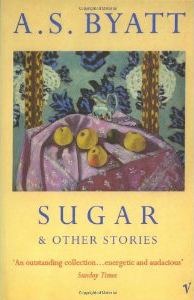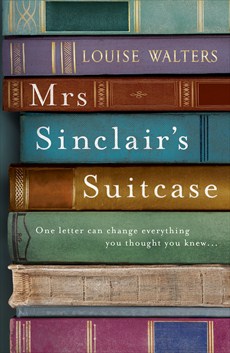A.S. Byatt: ‘The July Ghost’
by Louise WaltersIn my early-to-mid-twenties, I decided it was time to take up reading again. I was newly single, I had a boring job, and I lived at home with my parents. I needed some excitement in my life so I returned to books. I’d read avidly as a child and into my teens, but I wasn’t sure where to pick up again, so I browsed for a while in a bookshop in Oxford (I can’t recall which one, but I like to think it was Blackwell’s) and I decided upon The Penguin Book of Modern Women’s Short Stories, edited by Susan Hill.

1996 Vintage edition of Sugar and Other Stories
One of the titles that particularly caught my eye was ‘The July Ghost’ by A.S. Byatt. I’ve always enjoyed ghost stories. And it was summertime when I bought the book, so it was an appealing title.
It’s an appealing story too. Written in the third person, an unnamed man has just met an American woman at a party in a hot and dusty London. He starts to tell this woman about his landlady and the ‘problem’ he has with her. He is hesitant to begin with, but the American woman draws him out, and he ends up telling her all about his situation (although he does admit to ‘bowdlerising’). He’d met his landlady a year ago, also at a party, and struck up a conversation with her, beginning “I think I must move out of where I’m living”; which is the very same line he has just used a year later on the American woman.
But the ‘problem’ with his landlady is real enough. He has been enjoying the peace and coolness of her garden, hearing local kids playing, and observing them climb over the wall to retrieve wayward balls. He has also noticed a silent boy, at first sitting nonchalantly in a tree, later entering the garden, and even the house. When he tells the landlady about the boy and asks if she minds him wandering into her house and garden, he discovers from her that the boy must be her dead son. The description of the boy’s clothes, his appearance and demeanour, are enough to convince the woman. The boy had been killed two summers previously on the common behind her house, knocked down by a car on a busy road. Her reaction to realising that this man, a mere lodger and a stranger, can see her dead son where she cannot, is spine-tingling in its understatement:
“He was used to her being silent. But this silence went on and on and on. She was just staring into the garden. After a time, she said, in her precise conversational tone, ‘The only thing I want, the only thing I want at all in this world, is to see that boy.’”
This story works, I think, for two reasons. Firstly, neither the landlady nor the man truly believes in ghosts. They both try to rationalise what he is seeing. He muses, but says nothing to his landlady, that “he might have seen another boy, maybe even a boy who had been given the T-shirts and jeans afterwards.” The landlady herself “almost immediately raised the possibility that what he had seen was what she desired to see, a kind of mix-up of radio waves.” He compares, almost callously I think, the woman’s loss with his own; having been dumped by his lover Anne, he believes that in some ways his loss is worse, because Anne was “voluntarily absent, an absence that could not be loved because love was at an end…”
Secondly, the July ghost is benign and harmless, barely noticeable, and indeed remains unseen by the one person who longs to see him. He is just a young boy, nice-looking, mild. “He is – was – a most likeable boy,” explains the landlady. The boy never speaks, nor is he threatening. But it does become apparent that he has a purpose; and he does make the lodger understand what he wants – which is for the lodger to have sex with his mum. It’s not made clear why, but the man theorises, perhaps correctly, that the ghost hopes he will be re-conceived, thereby bringing his mum the comfort she craves. It’s a childish, naïve idea, and at this point the story risks descending into nonsense. The lodger attempts to have sex with the woman. It’s embarrassingly unsuccessful. “Sex and death don’t go,” the lodger says, apologising to his landlady. He leaves her bedroom, and finds the boy waiting expectantly on the landing. The man apologises to him too.
The story is told in medias res, and we are now up to date with events as the man chats to the American woman at the party. He agrees to move out of his lodgings and in with her. He returns to his lodgings and the following day, he explains he must leave and the landlady is in agreement, saying “it had to be better if ‘all this’ came to an end.” The man reflects that she is “too strong” and it would take “years to wear away that stony, closed, simply surviving insensibility.” The man wishes he could help, and feels guilty that he can’t, and guilty that he’s decided to leave. He packs, and then wanders out into the garden in hopes of seeing the boy one last time… ambiguous endings in short stories often disappoint me, but ambiguity is suited to this beautifully poignant story. The last line is a corker.
Even as a young woman whose maternal feelings (I thought) had not yet emerged, I was hugely moved and thrilled by this story. In the twenty or so years since I bought that book, I’ve become a writer and a mother, and I’ve learned that A.S. Byatt lost her own son in similar circumstances to those she describes in ‘The July Ghost’. It’s a brave and beautiful story, and I am, of course, more moved and thrilled by it than ever.
 Louise Walters was born in Oxfordshire and now lives in Northamptonshire with her husband and five children. She graduated from the Open University in 2010. Her debut novel Mrs Sinclair’s Suitcase, about generational secrets, soulmates and missed opportunities, is published by Hodder & Stoughton in hardback and eBook. Read more.
Louise Walters was born in Oxfordshire and now lives in Northamptonshire with her husband and five children. She graduated from the Open University in 2010. Her debut novel Mrs Sinclair’s Suitcase, about generational secrets, soulmates and missed opportunities, is published by Hodder & Stoughton in hardback and eBook. Read more.
‘The July Ghost’ appears in A.S. Byatt’s Sugar & Other Stories (Chatto & Windus, 1987; Vintage, 1995) and The Penguin Book of Modern Women’s Short Stories (Penguin, 1991). Her other story collections are The Matisse Stories (1993), The Djinn in the Nightingale’s Eye (1994), Elementals: Stories of Fire and Ice (1998) and Little Black Book of Stories (2003).
www.asbyatt.com

